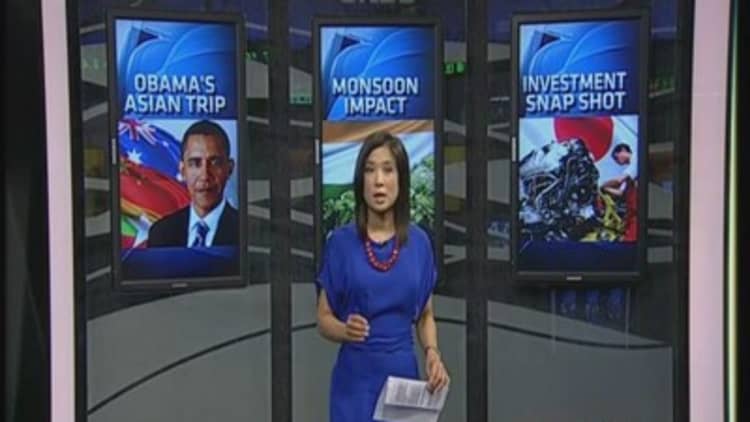
A deluge of economic data from Asia's biggest economies, central bank meetings along with a world leaders' summit will take center stage in the region this week.
China kicks off the data release with inflation indicators for the month of October due on Monday, followed by fixed asset investment (FAI), retail sales and industrial output for the same month on Thursday.
Economists polled by Reuters forecast core consumer price index (CPI) rising 1.6 percent on-year, unchanged from September's reading. Wholesale prices, meanwhile, is expected to fall 2 percent from the year-ago period, a tick higher than the 1.8 percent decline in the preceding month. Producer prices in China have been declining since February 2012 due to falling commodity prices, overcapacity and weakening demand.
October's industrial output is seen rising 8 percent from the same period in 2013, unchanged from last month's data.
Shane Oliver, head of strategy and chief economist at AMP Capital, expects to see evidence that the world's second-largest economy remains in a soft patch, giving policymakers room for more stimulus. "[I don't expect data] to show any acceleration in growth, but will remain consistent with gross domestic product (GDP) growth of around 7 to 7.5 percent," AMP's Oliver wrote in a note. "The case for further monetary easing in China remains strong."
Read MoreChina President: Risks to economy "not that scary"
In Japan, focus will be on the country's latest current account and machinery orders print for clues on what the central bank will do next.
The Bank of Japan surprised markets late last month by expanding its massive stimulus spending in a stark admission that economic growth and inflation have not picked up as much as expected after a sales tax hike in April.
Analysts from National Australia Bank expects the current account balance to remain in the black for a third straight month in September, but surplus will narrow to "a meager 36.9 billion yen, down from 130.8 billion yen in August."
Meanwhile, machinery orders is forecast to decline 1.9 percent on-year for the month of September, a reversal from August's 4.7 percent jump, according to a Reuters poll.
"Core private sector machinery orders rose strongly over the past three months so we'll likely see some pullback in September. But unless a substantial fall is recorded, which we aren't expecting, the underlying trend of firming orders remains intact," analysts at Moody's Analytics wrote in a note.
Read MoreAre Japan stocksa bargain yet?
Malaysia and Hong Kong will be on third quarter GDP-watch on Friday. The latter will be in focus, as the ex-British colony announces its first growth report since pro-democracy protests broke out in end-September. A recent report by the University of Hong Kong downgraded its growth forecast for the city from 3.4 percent to 2.2 percent, citing economic uncertainty in Europe and on the mainland, as well as turbulence caused by the democracy protests, to weigh on growth.
India will wrap the week with the release of its main inflation gauge late Friday. The wholesale price inflation (WPI) for October will rise an annual 3 percent, a notch up from last month's near three-year low of 2.38 percent, according to Moody's Analytics.
"Food inflation has eased as the price of onions dropped 58 percent year on year on better crop yields and a fading year‐ago base effect. Fuel price inflation has cooled as the lowering of fuel subsidies over the past year has now been absorbed into wholesale prices," analysts said.
Read MoreCrackdown on 'black money' takes off in India
In the rest of Asia, focus will fall on the central bank meetings in South Korea and Indonesia on Thursday. Both central banks are expected to hold fire on interest rate cuts for the month of November.
Meanwhile, 21 world leaders, including U.S. President Barack Obama, from the APEC community will meet in Beijing on November 11 to discuss major topics ranging from economic integration, reform to growth prospects. Also, the G20 Leaders' Summit will take place on November 15-16 in Brisbane, Australia.
But analysts expect the summits to be "non-events" for markets. "Talks will revolve around trade [so] generally I don't think it is much interest to markets and there shouldn't much reaction," said Richard Jerram, chief economist at Bank of Singapore.

